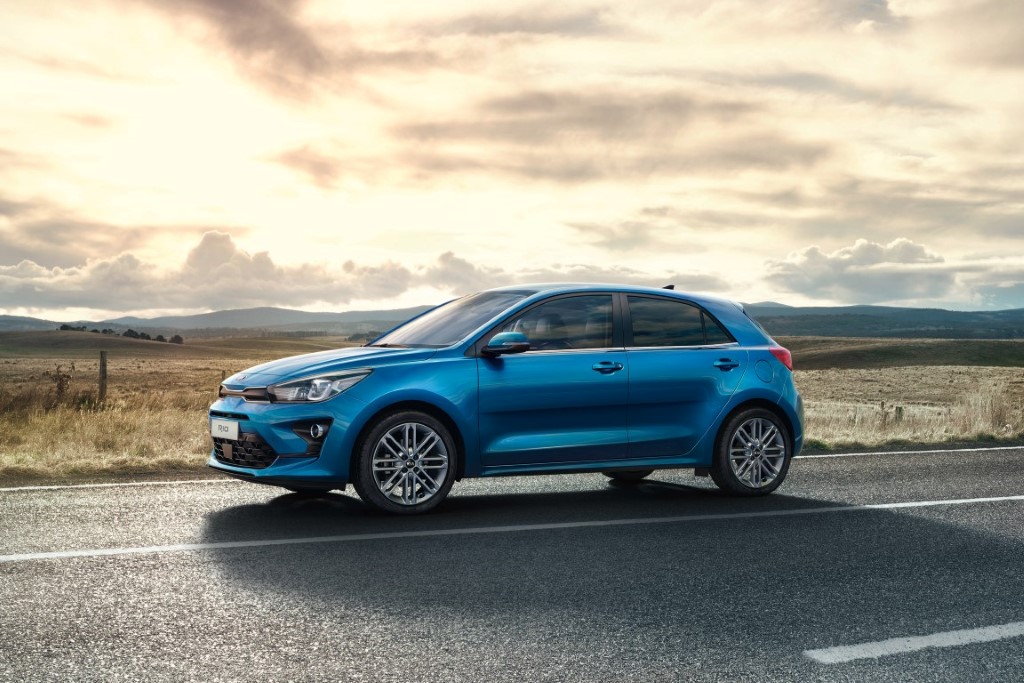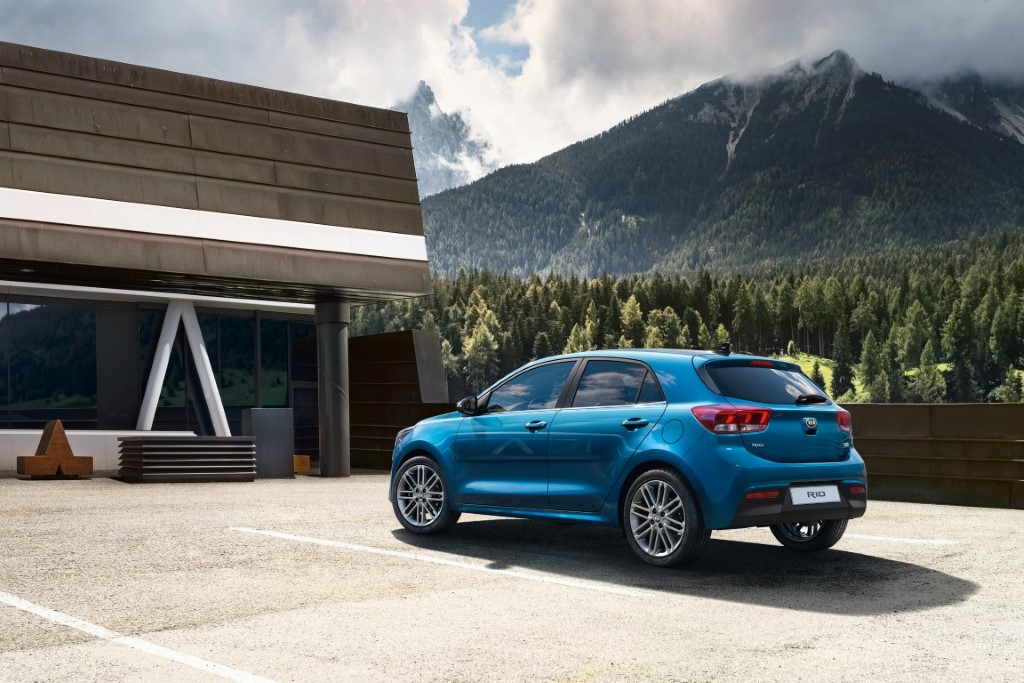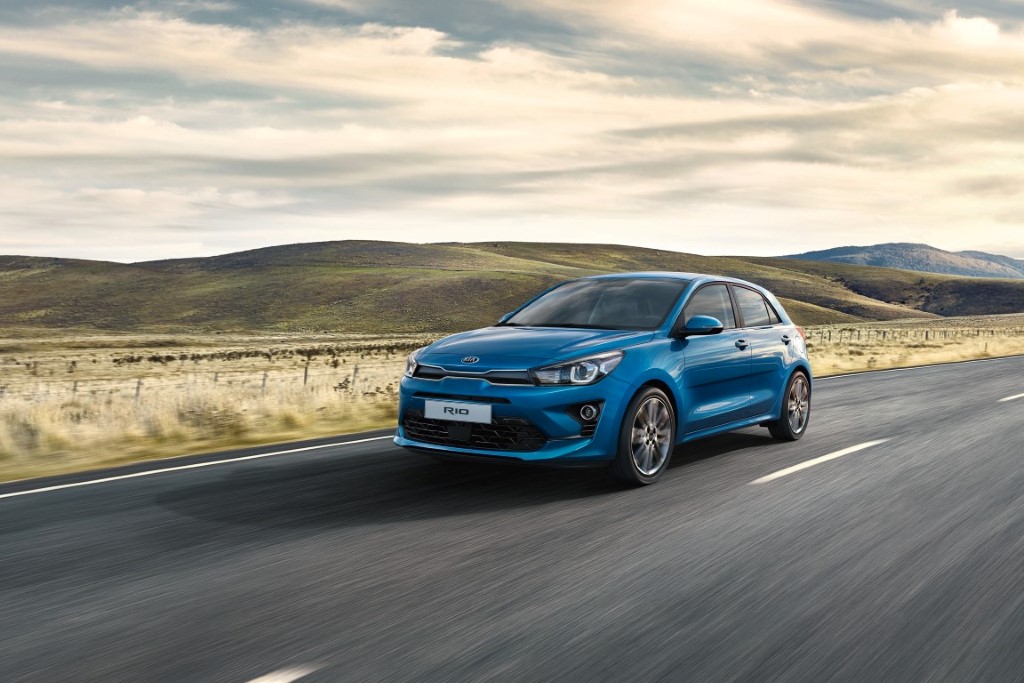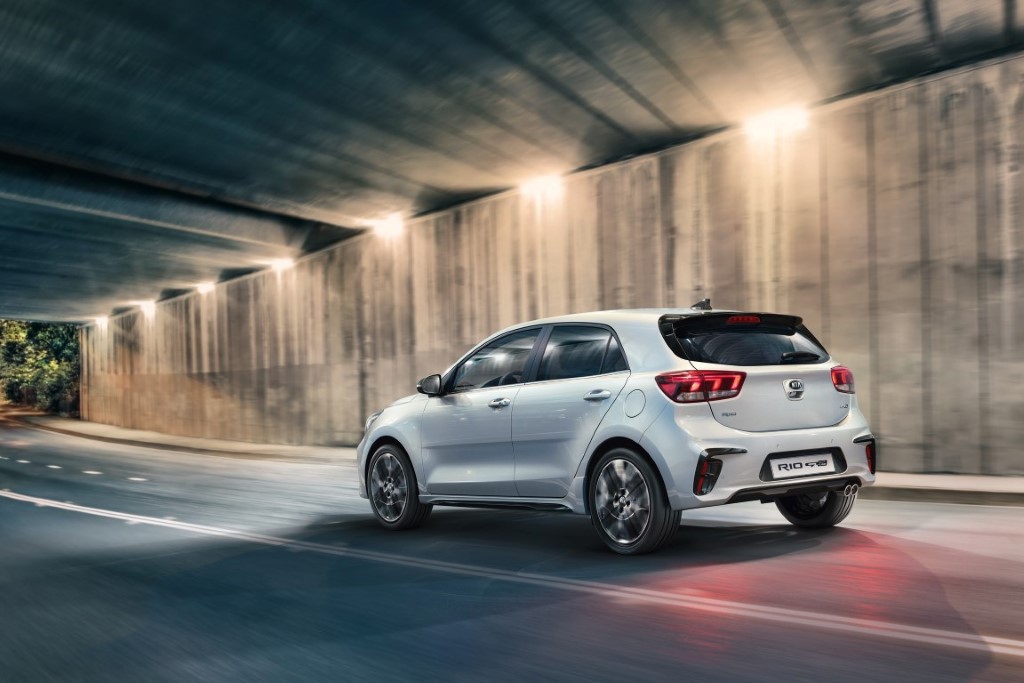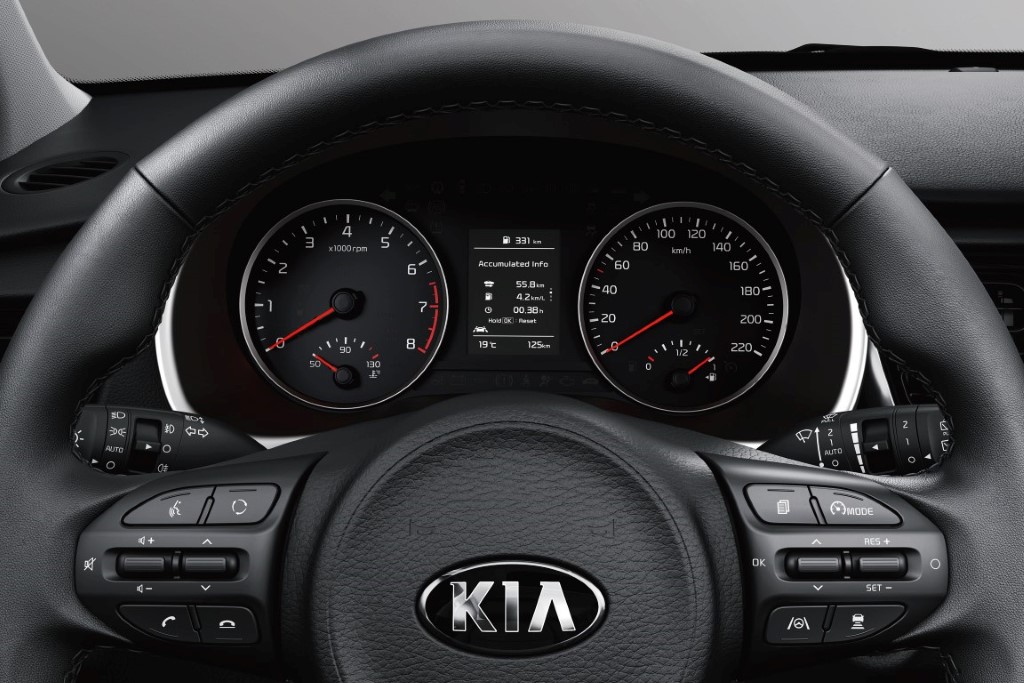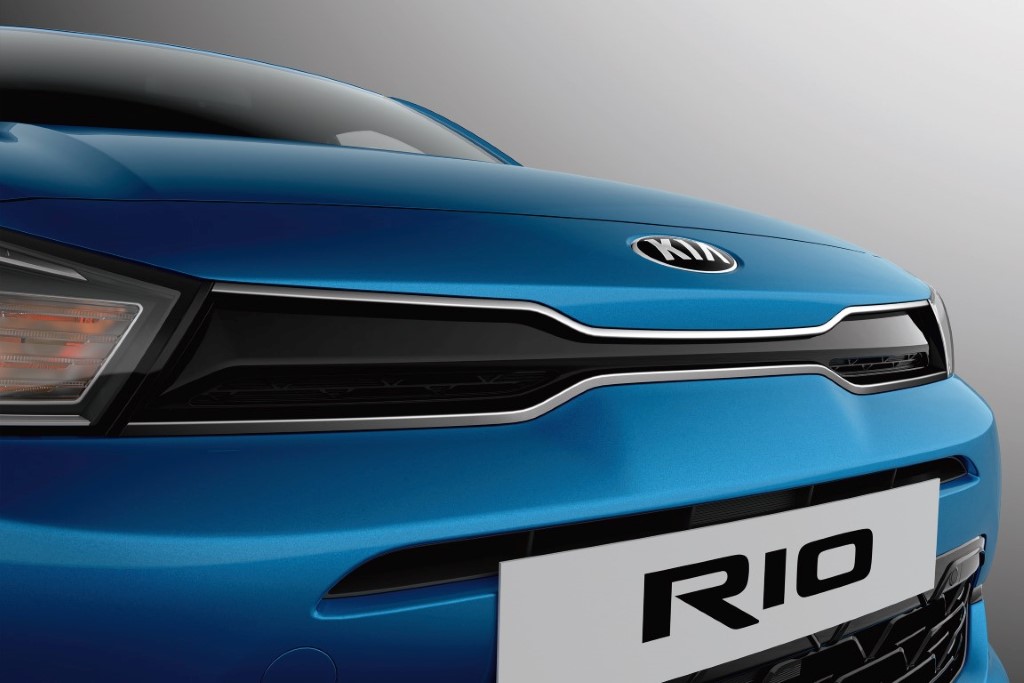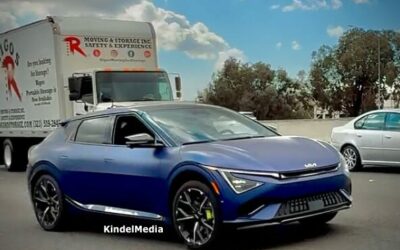
Kia Motors has announced a significant upgrade to the fourth-generation Kia Rio. The upgraded model features a range of enhancements to reinvigorate the car’s position within the highly competitive B-segment but it is still behind of its main competitors that had even standard Full LED headlights, which is still missing in this Rio. Hit the jump to discover what’s in and lacking.
[ads id=”9″]
Despite the claim of big improvement, I think the Rio should received a big makeover after the arrival of a battery of new B-segment cars like the new i20, Peugeot 208, Opel Corsa, Renault Clio. The Rio is still lacking of Full LED headlights, digital cluster and the advanced safety systems announced are only available under the choice of the 7-speed DCT automatic trasmission. The Rio is a car with a big potential that I don’t know why they don’t want to sell it good.
Press release
The upgraded Rio pairs an updated exterior and interior design with ‘big car’ safety and infotainment technologies. The new model also offers drivers new efficient powertrains – including Kia’s first petrol 48V mild-hybrid system, equipped with one of the first applications of the company’s new ‘clutch-by-wire’ intelligent manual transmission.
Emilio Herrera, Chief Operating Officer for Kia Motors Europe, commented: “The Rio is an important car for Kia in Europe and worldwide, and is an entry point into the Kia brand for many drivers. The upgraded model builds on the car’s key strengths – practicality, quality and technology – with newly electrified powertrains, a refreshed design, and advanced safety and telematics features often found in cars many segments above. We are convinced these upgrades will make the Rio more successful than ever.”
European sales of the upgraded Kia Rio start during the third quarter of 2020. It is sold with Kia’s industry-leading 7-Year, 100,000-mile warranty as standard. UK specification, on-sale date and pricing will be announced in due course.
New EcoDynamics+ petrol mild-hybrid with new intelligent Manual Transmission
The Rio is the first Kia powered by a petrol mild-hybrid electric vehicle (MHEV) powertrain. The new ‘EcoDynamics+’ powertrain pairs Kia’s new ‘Smartstream’ 1.0-litre T-GDi (Turbocharged Gasoline Direct injection) engine with Kia’s 48V MHEV system, maximising fuel efficiency with electric torque assistance and regenerative braking.

[ads id=”8″]
EcoDynamics+ has been engineered to deliver greater efficiency from internal combustion engines on the road, seamlessly deploying and recuperating electric power. The system supplements the engine’s torque output with power from a compact 48-volt lithium-ion polymer battery, and extends engine ‘off time’ with a new Mild-Hybrid Starter-Generator (MHSG) unit.
The MHSG is connected by a belt to the engine’s crankshaft, and switches seamlessly between ‘motor’ and ‘generator’ modes. In ‘motor’ mode, under acceleration, the MHSG provides electric power assistance to reduce engine load and emissions. As the car decelerates, the MHSG has the ability under certain conditions to switch to ‘generator’ mode, recuperating energy from the crankshaft to recharge the battery.
The new Smartstream engine replaces the Rio’s earlier ‘Kappa’-generation 1.0-litre T-GDi, and is equipped with Kia’s advanced Continuously Variable Valve Duration (CVVD) technology, among a range of other innovations. CVVD enables the engine to switch seamlessly between different combustion cycles depending on load, maximising efficiency in all driving situations. The Smartstream engine produces the same power as the previous Kappa engine line – 100 ps or 120 ps – but enables 16 per cent higher peak torque output for 120 ps variants (200 Nm).
Overall, the new EcoDynamics+ powertrain reduces the Rio’s CO2 emissions by between 8.1 per cent and 10.7 per cent (NEDC, combined cycle), and is offered on both 100 ps and 120 ps versions of the new engine. Both 48V powertrains will be equipped with a Drive Mode Select system, giving drivers the choice to customise their drive with ‘Eco’, ‘Sport’ and ‘Normal’ modes.
The Rio EcoDynamics+ is also one of the first models from Kia to be equipped with the brand’s new intelligent Manual Transmission (iMT). The ‘clutch-by-wire’ system contributes to the MHEV system’s greater fuel efficiency and lower CO2 emissions, while retaining the driver engagement of a conventional manual transmission.
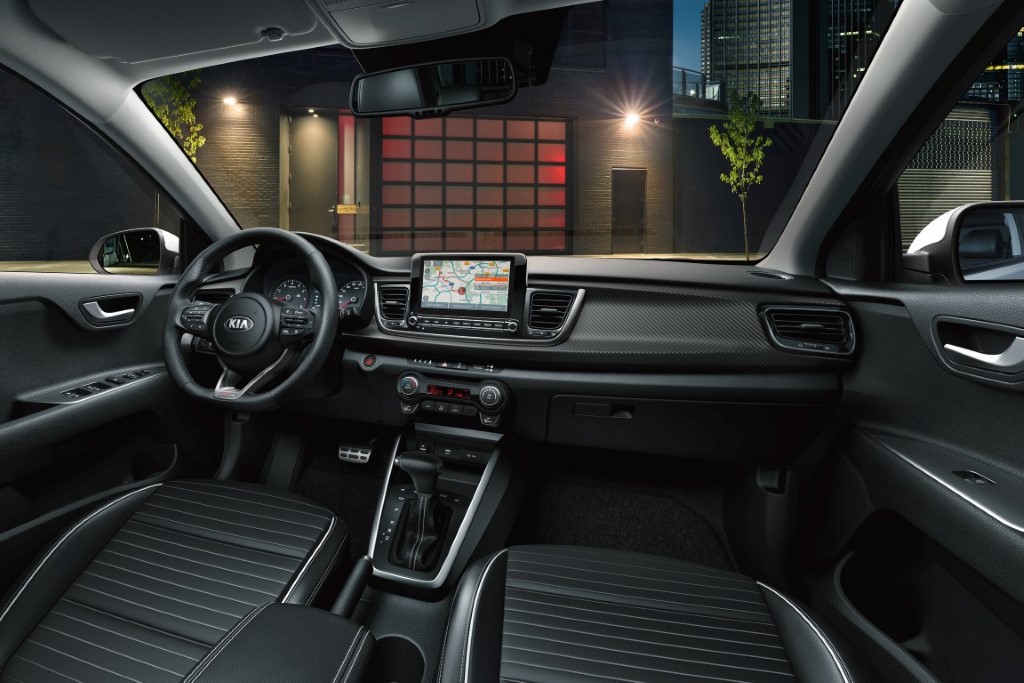
[ads id=”8″]
Instead of a mechanical linkage, the iMT’s clutch is controlled purely electronically. It integrates seamlessly with the MHSG to switch off the engine earlier than Kia’s Idle Stop & Go start-stop system when coasting to a halt, improving overall fuel efficiency.
Official performance and efficiency figures for the upgraded Rio’s mild-hybrid powertrains will be announced closer to the car’s on-sale date.
New Smartstream petrol powertrains
The upgraded Kia Rio also features major revisions to its existing range of petrol engine options, maximising efficiency, lowering CO2 emissions, and improving driveability. As well as EcoDynamics+ models, the Rio line-up is now offered in Europe with a choice of Smartstream petrol engines – the new 100 ps 1.0-litre T-GDi engine, and a new version of Kia’s naturally aspirated 1.2-litre engine, with innovative Dual Port Injection technology and a power output of 84 ps.
The 100 ps 1.0-litre T-GDi engine is also now offered with a six-speed manual transmission, replacing the earlier five-speed manual, and Kia’s seven-speed auto dual-clutch transmission (7DCT).
Kia engineers have also upgraded the Rio’s Idle Stop & Go (ISG) system, in recognition of the car’s use in urban areas in markets around the globe. The new brake-linked ISG system offers additional fuel savings by switching off the engine when both the brake and clutch pedal are depressed as the car comes to a halt. The engine switches back on when both pedals are released and the car re-engages the driver’s selected gear. Previously the system was linked exclusively to the clutch. This small adjustment contributes to the Rio’s improved fuel economy and lower emissions.
Official performance and efficiency figures for the upgraded Rio’s improved internal combustion powertrains will be announced nearer to the car’s on-sale date.
Upgraded infotainment with innovative UVO Connect ‘Phase II’ telematics
The Rio features an upgraded touchscreen satellite navigation system, and is one of the first Kia models in Europe to offer the brand’s innovative ‘Phase II’ UVO Connect telematics system, enhancing vehicle connectivity and control, and taking the stress out of journeys.
The upgraded Rio is equipped with a larger 8.0-inch touchscreen display, offering Display Audio or Satellite Navigation depending on vehicle specification. The new system also features Bluetooth® multi-connection, enabling users to connect up to two mobile devices at the same time – one for hands-free phone and multimedia use; the other for media use only. Its advanced split-screen functionality lets users control or monitor different vehicle features at the same time, customising the screen with a series of different widgets. The system offers wireless Apple CarPlay™ and Android Auto™ on models equipped with the new 8.0-inch Display Audio system, negating the need for many owners to connect their smartphone via a cable.
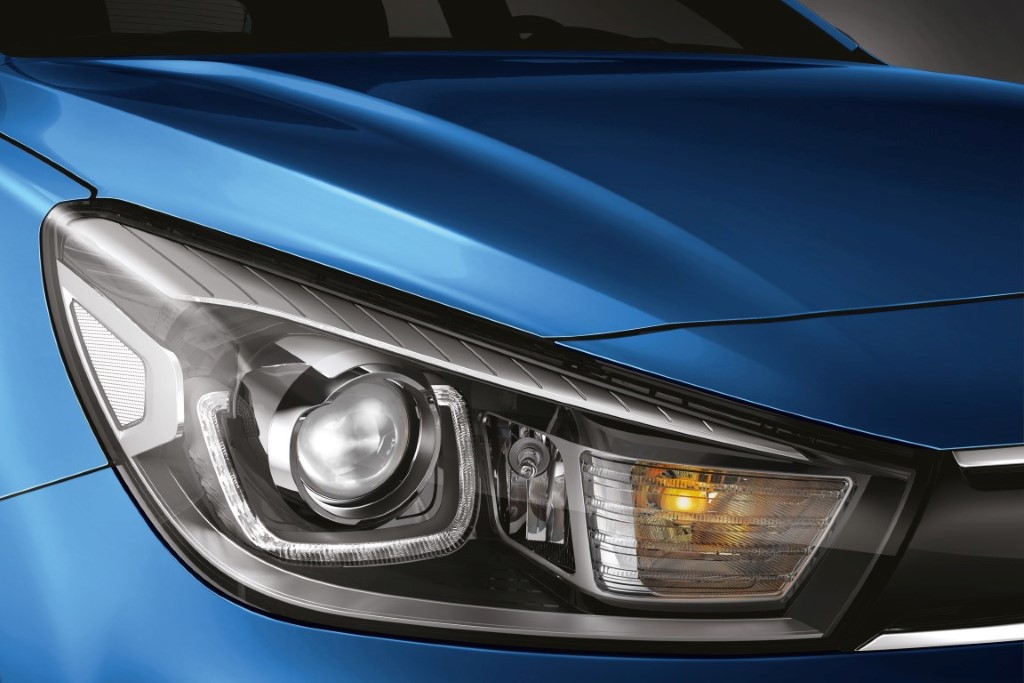
[ads id=”8″]
Offering Kia’s UVO system, the Rio is among the first Kia vehicles to offer new ‘Phase II’ UVO Connect telematics features. The Rio gives drivers access to a range of ‘Phase II’ On-Board Services, in addition to live traffic information, weather forecasts, points of interest (POIs), fuel prices, and details of potential on- and off-street parking – including price, location and availability. The system also features Online Voice Recognition, supported by server technologies, which lets users give voice commands, hands-free, to search for nearby POIs, addresses, weather updates, or send text messages.
The UVO App, compatible with Android and Apple smartphones, also offers a range of new ‘Phase II’ features, enabling owners to activate a range of functions and features remotely. Depending on country, users can remotely send route directions to their car before a journey, check the location of their vehicle, and access vehicle reports and diagnostic notifications.
Kia will reveal more details of UVO Connect ‘Phase II’ technologies before sales of the new model commence in Q3 2020.
Subtly refreshed – a clean and classy exterior design
The updated Rio has a refreshed front design exuding style and sportiness. Other tweaks simplify the car’s design, creating a tasteful and uncluttered appearance.
The refreshed design retains the car’s iconic ‘tiger-nose’ grille, narrowed for a more focused appearance and matched by a lower, wider front bumper and distinctive new fog lamp housing. These changes give the front of the car a smoother, yet more purposeful appearance, imbuing it with a more confident stance on the road. All models now feature new full LED headlamps with integral running lights.
Two new exterior colours are introduced with the upgraded model, Perennial Grey and Sporty Blue, bringing the total number of paint palette options to nine, depending on specification and market. The upgraded model is also offered with a new eight-spoke 16-inch alloy wheel design.
Upscale interior atmosphere and new colour customisation options
Inside, the Rio features a series of visual, material and technological upgrades to create a more upscale atmosphere and enhance quality. The main update is a new larger 8.0-inch widescreen, and a higher-resolution 4.2-inch digital display in the driver’s instrument cluster.
The Rio is also now available with a new interior customisation option in the form a new blue colour pack, depending on vehicle specification and market. This adds a dash of colour and flair to the cabin, with coloured seat bolsters, dashboard and door arm rests, matched with contrast stitching. GT-Line models are offered with a black single-tone interior with white contrast piping and stitching on the seats, and a carbon fibre-effect dashboard for added visual impact.
[ads id=”8″]
Both standard and GT Line models are also now equipped with driver and optional front passenger seat height adjustability, helping front-seat occupants find their ideal position.
New ADAS safety technologies available
The upgraded Rio features several of Kia’s latest Advanced Driving Assistance Systems (ADAS), such as Forward Collision-Avoidance Assist (FCA) with pedestrian, vehicle and newly introduced cyclist recognition, Lane Keeping Assist (LKA), Driver Attention Warning (DAW), and Blind Collision Warning (BCW).
Furthermore, the Rio now offers several new active safety systems to enhance occupant safety.
Depending on specification, the Rio’s new ADAS range includes the latest version of Kia’s FCA system, and is also available with Blind-Spot Collision-Avoidance Assist (BCA)*, Intelligent Speed Limit Warning (ISLW), Smart Cruise Control (SCC)*, and Lane Following Assist (LFA).
LFA in collaboration with SCC controls acceleration, braking and steering depending on the vehicles in front and road conditions. Operating at speeds below 180 kph, it uses camera and radar sensors to maintain a safe distance from the car in front, while monitoring road markings to keep the Rio in the centre of its lane. The Rio also features Rear Cross-Traffic Collision-Avoidance Assist (RCCA)* and Rear Occupant Alert (ROA).
Finally, a Leading Vehicle Departure Alert is also available, depending on specification, as a first-in-class innovation. If the driver stops the Rio in heavy traffic or at a red light, it alerts them if the car in front moves away and the Rio driver does not notice. This helps avoid the potential embarrassment of other impatient road users ‘reminding’ the driver to move off instead.
The updated Rio is equipped with Kia’s Vehicle Stability Management (VSM), Electronic Stability Control (ESC), Cornering Brake Control (CBC) and Straight-line Stability (SLS) systems as standard, helping drivers maintain control under braking and cornering.
The upgraded model is fitted with six airbags throughout the cabin, as well as ISOFIX child-seat tether and anchor points.
On sale: updated Rio arrives in Europe in the third quarter of 2020

